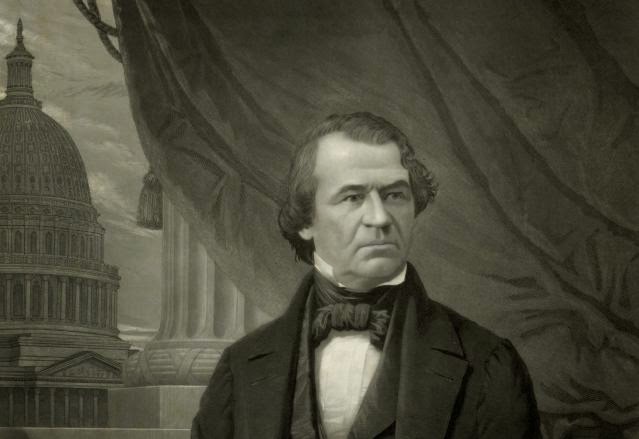APRIL 29, 1865:
“This Cause has gone.” --- Tench Tilghman
I
Andrew Johnson issues two
Executive Orders today:

Order
Ending Commercial Restrictions on Confederate States
Being
desirous to relieve all loyal citizens and well-disposed persons residing in
insurrectionary States from unnecessary commercial restrictions and to
encourage them to return to peaceful pursuits ---
It
is hereby ordered,
I.
That all restrictions upon internal, domestic, and coastwise commercial
intercourse be discontinued in such parts of the States of Tennessee, Virginia,
North Carolina, South Carolina, Georgia, Florida, Alabama, Mississippi, and so
much of Louisiana as lies east of the Mississippi River as shall be embraced
within the lines of national military occupation, excepting only such
restrictions as are imposed by acts of Congress and regulations in pursuance
thereof prescribed by the Secretary of the Treasury and approved by the
President, and excepting also from the effect of this order the following
articles contraband of war, to wit: Arms, ammunition, all articles from which
ammunition is manufactured, gray uniforms and cloth, locomotives, cars,
railroad iron, and machinery for operating railroads, telegraph wires,
insulators, and instruments for operating telegraphic lines.
II.
That all existing military and naval orders in any manner restricting internal,
domestic, and coastwise commercial intercourse and trade with or in the
localities above named be, and the same are hereby, revoked, and that no
military or naval officer in any manner interrupt or interfere with the same,
or with any boats or other vessels engaged therein under proper authority,
pursuant to the regulations of the Secretary of the Treasury.
and
Proclamation
130 –
Postponing
the Day of Mourning for the Death of President Lincoln Until June 1
Whereas
by my proclamation of the 25th instant Thursday, the 25th day of next month,
was recommended as a day for special humiliation and prayer in consequence of
the assassination of Abraham Lincoln, late President of the United States; but
Whereas
my attention has since been called to the fact that the day aforesaid is sacred
to large numbers of Christians as one of rejoicing for the ascension of the
Savior:
Now,
therefore, be it known that I, Andrew Johnson, President of the United States,
do hereby suggest that the religious services recommended as aforesaid should
be postponed until Thursday, the 1st day of June next.
In
testimony whereof I have hereunto set my hand and caused the seal of the United
States to be affixed.
Done
at the city of Washington, this 29th day of April, A. D. 1865, and of the
Independence of the United States of America the eighty-ninth.
ANDREW JOHNSON.
By the President:
W. HUNTER,
Acting Secretary of
State.
II
The “body” of John Wilkes Booth
is “secretly” dumped into the Potomac River in the dead hours of the night by
order of Edwin M. Stanton, who is still behaving as Acting President. Stanton
makes sure that this inglorious burial becomes known. Harper’s Weekly even illustrates the event. Edwin McMasters Stanton
wants no Confederate memorials to spring up for Booth.

However --- it isn’t true. No
one knows whose body was disposed of (an anonymous Confederate or even Union
Booth look-alike?), but Booth’s body is embalmed, brought back to Washington
under guard, and locked in an icehouse.
III
The Lincoln Funeral Train
arrived in Columbus, the capital city of Ohio at 7:00 A.M. in a driving
rainstorm. By the time the President’s body was removed for transport and yet
another funeral service to the Old Statehouse, however, the weather had
cleared.
The Columbus funeral was marked
by flowers --- specifically lilacs, in keeping with Walt Whitman’s
recently-published poem which had swept the grieving nation like a macabre
modern pop song. Those who had been traveling with Lincoln’s body since
Washington would be forever haunted by the smell. However, the flowery tribute, an innovation
for Lincoln’s funeral, became an American custom observed to this day.


50,000 mourners viewed
Lincoln’s body in Columbus; however, that number was just a fraction of the
crowd that had gathered, so after Lincoln’s casket was returned to the train at
6:00 P.M. the catafalque on which it lay was heaped with flowers and mourners
continued to pass it. Fresh flowers would be placed on the catafalque daily
until Lincoln’s entombment in Springfield five days hence.
IV
Jefferson Davis’ entourage
moves south through Union, South Carolina. Although Davis is cheered by the
local inhabitants, Tench Tilghman, a Maryland-born Confederate Colonel named
for his Revolutionary War hero grandfather, notes the woebegone appearance of
the President and his escort, and reaches a harsh conclusion when Davis has to
beg a nightshirt from a loyal Confederate who offers to put him up overnight.
“This Cause has gone up, and God alone knows
how it will end,” Tilghman tells his diary.

No comments:
Post a Comment